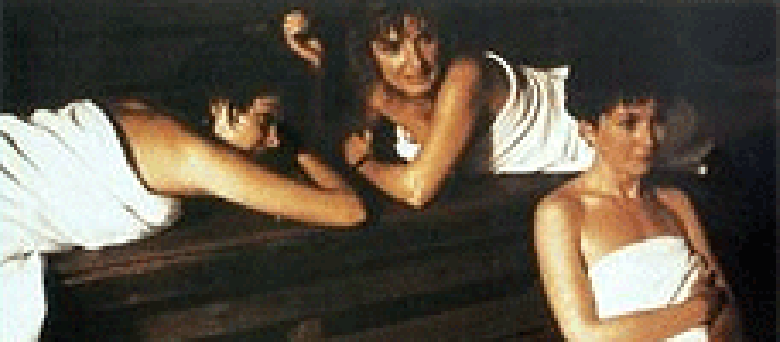Reviews
Le déclin de l’empire américain
Denys Arcand
Canada, 1986
Credits
Review by Eva Holland
Posted on 25 June 2008
Source Seville Pictures DVD
The Decline of the American Empire begins with a theory: that the single-minded pursuit of personal happiness will become the dominant force in a civilization only in the moments before its inevitable decline. The proponent of this theory is Dominique, an academic in Montreal. She expounds on the idea to a female reporter, Diane, in the opening frames – and the rest of the film is essentially an attempt to demonstrate its truth.
After the interview, Dominique and Diane join Danielle and Louise at the gym. Meanwhile, four men – Remy, Pierre, Alain and Claude – are preparing an elaborate dinner at a large lake-side house. Separately, the two groups both indulge in afternoon-long conversations about their sex lives: Louise speaks cavalierly about her husband’s indiscretions when he travels, but suggests that she is satisfied knowing he is well-behaved at home; Pierre describes the high he gets from cruising in Montreal’s gay hotspots. Diane reveals that she is involved in an increasingly violent dominant-submissive relationship, and notes, with relish, her discovery of the immense “power of the victimâ€; Remy recalls the time that he visited one of his assorted mistresses, and then – with his wife and dinner waiting – paused on the way home to pick up a prostitute, too.
The bulk of the film is filled by this conversation, and you might wonder whether the script would have been just as well suited for a radio play. But the characters are in constant motion as they talk – doing leg lifts, chopping tomatoes – and something about those familiar motions lends additional texture to the salacious chit-chat. Not that director Denys Arcand is ever so unsubtle as to insert any explicit innuendo – no one is stroking the neck of a wine bottle while they recall their last affair here – but the physical detail of the characters’ actions, which occupies most of the camera’s attention, adds to the charged atmosphere in both settings.
The conversation can be a little jarring to observe. We may be inured to even the most explicitly sexual dialogue in TV and movies these days, but we’re also accustomed to hearing the words come from the mouths of young, beautiful people. These dowdy, middle-aged professionals don’t seem the type to be calmly discussing sex tourism or swingers parties – and that, of course, is part of the point. Also jarring is the casual racism that crops up from time to time; it’s not clear whether those moments are an unconscious product of the time, or whether Arcand inserts them deliberately, to demonstrate another aspect of his protagonists’ characters. Given his sensitive, thoughtful rendering of Pierre – a gay man on the big screen, years before Philadelphia – I suspect it’s the latter. (Though of course it’s entirely possible to be completely homophobia-free, and still be a racist.)
Soon enough, it becomes clear that the two groups are connected, and eventually the women join the men at the house for dinner. There, what begins as a lovely evening with old friends rapidly degenerates, as the deep unhappiness covered up by the afternoon’s bold, risqué conversations rise to the surface. Secrets are spilled, grievances are voiced, and a group that started out seeming confident, modern, and sexually satisfied begins to appear completely unfulfilled, sexually or otherwise.
Hanging over all this are two specters: AIDS, and the bomb. Arcand’s suggestion is clear: that the characters’ sexual habits are less a product of desire, and more a product of fear and boredom; a fruitless, endless chase after a short-lived high. Dominique was in fact speaking of herself and her friends in the opening: It is 1986, the final days of the American empire, and the protagonists’ obsessive – and ultimately empty – hunt for personal satisfaction lets us know that the end is near.
The Decline of the American Empire is certainly not the only Cold War-era movie to flirt with the apocalypse. The difference, though, is that while others predicted concrete, political or military catastrophes, Arcand is positing a cultural apocalypse, not a physical one. It is these more abstract ideas that lend the movie its compelling power today. Certainly, you could argue that the North America of 2008 isn’t all that different from the North America of 1986: the twin specters of disease and annihilation still dominate people’s fears, and the single-minded pursuit of personal happiness still dominates their day-to-day efforts. The difference is that today, we have ever more plentiful and sophisticated means to achieve that happiness – or at least, the sorts of instant gratification that often serve as substitutes to a more lasting and deep-rooted contentment. The hair styles and fashions, the racial language, even the image quality of the film all date this movie – but the ideas are still entirely relevant today.
One thing that Dominique never clarifies is whether the pursuit of personal happiness is a symptom of, or a cause of, society’s decline. Are Diane, Remy, Claude and Louise victims of their empire’s decline, intended to evoke sympathy? Is the viewer meant to judge them as the self-serving catalysts of Arcand’s prophesied cultural apocalypse? Or are we merely meant, for better or worse, to see ourselves in their bravado, their dishonesty, and their frenzied efforts at self-satisfaction?
The second and third films in Denys Arcand’s trilogy, the Oscar-winning The Barbarian Invasions and 2007’s Days of Darkness, are both set in our own time. I’ll be curious to see how our protagonists make out in the new millennium.
We don’t do comments anymore, but you may contact us here or find us on Twitter or Facebook.



